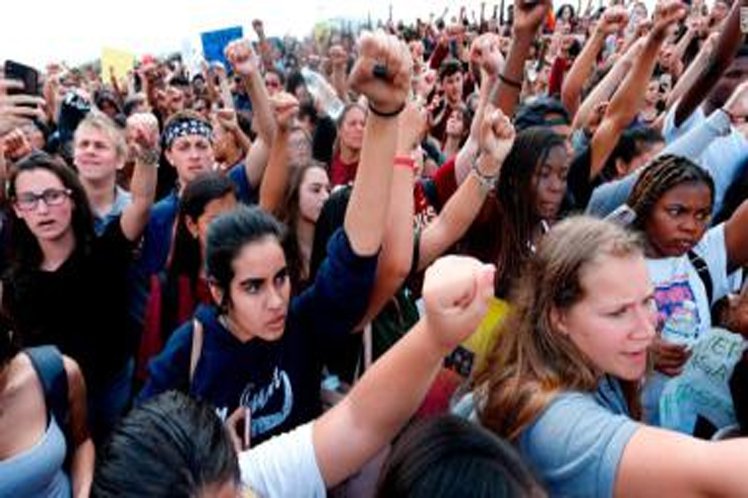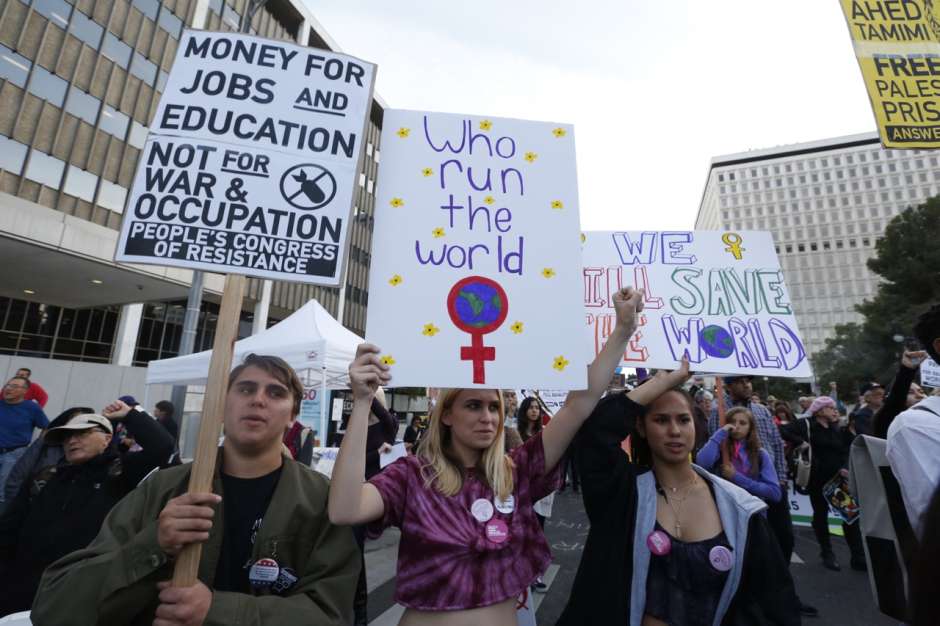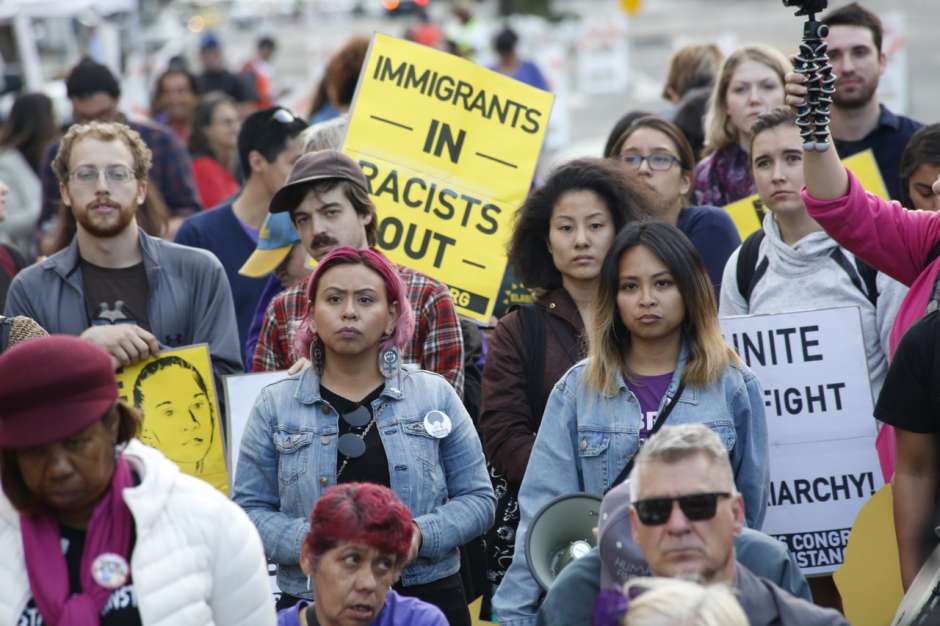Translations 677
NRA Responds to U. S. Protests
NRA Responds to U. S. Protests with AR-15 Rifle Picture
Translated and edited by Walter Lippmann for CubaNews
Washington, 14 Mar (PL) As thousands of students in the United States today demand concrete action against gun violence, the powerful and controversial National Rifle Association (NRA) published an image of the type of weapon used in a recent massive shooting.
“I’ll control my own weapons, thank you,” reads a Twitter publication of the main lobby in favor of these artifacts in the country.
That message is written on a picture of an AR-15 rifle, similar to the one used a month ago by the murderer who left 17 dead and as many injured in a secondary school in the city of Parkland, Florida.
Next to the image is added the label #2A, referring to the Second Constitutional Amendment of the United States, which establishes the right of citizens of this country to bear arms.
The tweet generated numerous reactions, including from supporters of the NRA’s viewpoint, who argue that advocating for greater arms control is tantamount to violating the amendment, or that mental illness is the cause of mass shootings.
But many Internet users criticized the organization for its rejection of any regulation that would make access to these devices more stringent.
“It is completely possible to have control of weapons and possess them at the same time. That’s common sense,” wrote one Twitter user, while another said the NRA is no longer a security group for hunting and weapons possession, but “a cowardly shriek for gun and ammunition manufacturers”.
Another of the responses to the lobby’s tweeting image pointed out that it always leaves out the most significant part of the second amendment, which speaks of the need for “a well-regulated militia”.
The same Internet user called for a ban on assault weapons and high-capacity loaders, universal background checks and raising the legal minimum age for acquiring a firearm.
Measures like these are being demanded by survivors of the February 14 shooting and by students who left their classrooms today for a 17-minute strike and other actions in honor of the victims of the massacre.
The NRA has reiterated its opposition to such proposals and has been the target of frequent criticism for that position and for its influence on the country’s politicians, especially Republicans, such as President Donald Trump, in whose campaign the organization invested millions of dollars.
“Hey, hey, NRA, how many kids did you kill today?” (NRA, how many children you killed today) screamed students who rallied this Wednesday in front of the Trump International Hotel in Manhattan, New York.
pgh/sea
US Students Strike for Gun Control
U. S. Students On National Gun Control Strike

Translated and edited by Walter Lippmann for CubaNews
Washington, 14 Mar (PL) Students from many U. S. cities will go on strike today to demand changes in the country’s gun control laws when the first month of the massive shooting in a secondary school in Parkland, Florida comes to an end.
Students from more than 3,100 schools and universities signed up to participate in this Wednesday’s initiative, during which they will leave classrooms for 17 minutes to show solidarity for the 17 deadly victims of the massacre in the southern territory.
The organizers of the event, called by a youth branch of the Women’s March, called for the participation of students from all schools, from elementary schools to universities, as well as parents and teachers.
Although the action is national in scope, student groups and educational institutions are expected to hold a variety of additional events at the local level, including assemblies, class discussions and memorial services.
According to USA Today, students at some schools such as University High School in Tucson, Arizona, will recite the names of the dead in Parkland and make plans to flood local lawmakers with lawsuits against guns.
“My colleagues and I feel that there is no moment more important than this to make it clear that we have had enough armed violence. For too long, it has made us feel insecure in our communities and in our classrooms,” said Dej Dej Foxx, a teenager from that school.
The action of this day follows other demonstrations in the days following the shooting in Parkland, which generated great activism among the survivors of the massacre, who called on politicians in the country to turn their backs on the National Rifle Association.
This Wednesday contrasts the stance of many educational institutions that support planned demonstrations and even encourage students to be active protagonists, with others that warned students with disciplinary actions if they interrupt classes.
This is the case for adolescents in some parts of New Jersey and southeast Texas, who were alerted last month that if they participated in the strike, they would face a three-day suspension.
According to Curtis Rhodes, superintendent of the Needville Independent School District, about 40 miles southwest of the Texas city of Houston, disruptions would not be tolerated because’ a school is a place to learn’, and he said they will impose disciplinary punishments’ regardless of whether it is one, 50 or 500 involved’.
Meanwhile, some districts in the country, such as one in South Carolina, said they will prevent the media from going to school during the protest, in order to discourage youth participation.
mem/sea
Che Guevara evening, with Janette Habel
 Louise Michel Society:
Louise Michel Society:
Che Guevara evening, with Janette Habel on February 24th.
Saturday, March 3, 2018 – 15:09
Translated and edited by Walter Lippmann for CubaNews,
Thanks to John Barzman for translation assistance.
Che was murdered in Bolivia fifty years ago. He was 39 years old.
On many continents, he remains one of the few positive figures among the revolutionary leaders of the 20th century. Is that why in Paris this anniversary was a pretext for an outburst of gross slander against him? Targeted, beyond him were the Cuban revolution and everything related to communism.
Che certainly played a decisive role in the Cuban revolution. Janette Habel underlines how much of a “geostrategic anomaly” it was: taking power by armed struggle, in a poor island, 200 kilometers from the shores of the American empire, and wanting to build socialism there!
Guerilla, then minister, Che was a central figure in the Cuban experience. However, it is difficult to attribute to him responsibility for the latter’s subsequent trajectory.
Janette Habel developed the themes that seem important to her when we look back at the history of this revolution and refrain from rewriting it.
First, the issue of armed struggle to conquer power. The foco strategy was not theorized by Che as a model that can be reproduced everywhere. The failures suffered in Latin America cannot therefore be explained on the basis of an alleged error on this point. All the more so as the other strategies – [such as] “changing the world without taking power”, parliamentary and electoral channels to change society… – have not demonstrated that they are a viable alternative and tend to lead to dead ends as well.
Then there is the difficult question of how much democracy is possible in situation of revolution and war with imperialism. The repressive aberrations of a government that quickly took authoritarian forms are indisputable. It remains to resituate them in this context and to understand the obstacles to this revolution and the limits of those who led it.
The third theme, on which Che has contributed a lot, is that of transition. As Minister of Industry, Che organized discussions with Bettelheim and Ernest Mandel to reflect collectively on these difficult issues. Criticism of the USSR was central, and was explicit in the discourse of Algiers. And it was on the challenges of economic diversification and industrialization that Che (and Cuba!) was to fail.
Dismissed from power and Cuba under Soviet pressure, Che made his move to Congo, then into the Bolivian adventure. Isolated, he was to fall under the blows of murderers. His call to “create two, three, many Vietnams” resonated powerfully in this century, but without allowing him to escape a lonely and tragic death…
A rich exchange followed Janet Habel’s presentation, confirming that Che is not only a romantic icon, let alone a demonic character as nreaction claims, but a revolutionary fighter and thinker of emancipation.
Janette Habel, member of Attac’s scientific council, lecturer, researcher at the Institut des Hautes Études d’ Amérique latine, specialist in Cuba.
PLEASE NOTE: The video below is in French.
Immigrants’ Voices Heard
La Opinion (Los Angeles, California)
Immigrants’ voices heard on International Women’s Day
They demand respect, they’re not afraid, but they also demand no end to fighting for their rights.
By Araceli Martínez Ortega. Reporter for the newspaper La Opinión since 2006.
March 8, 2018
Translated and edited by Walter Lippmann for CubaNews

Hundreds gathered in downtown Los Angeles. Photo: Aurelia Ventura.
Alondra Becerra, a young university student of the English literature career, a dancer, and who has two jobs, one as a waitress and the other serving coffee, took time on her busy schedule to attend and lead a march in downtown Los Angeles to celebrate International Women’s Day.
“I’m here for my mom who raised me as a single, sick mother. She is a Mexican immigrant who inspired me to fight for people. I am here for mothers and women who do not know that they have rights and do not go out to fight. For them, I’m here,” Becerra said as she stood in front of the marchers with a long blanket that read “International Women’s Strike.

Immigrants in; racists out,” read one of the march’s posters. Photo: Aurelia Ventura
AUTHOR’S VIDEO: https://www.instagram.com/p/BgFhXn4hNrN/
To immigrants like her mother, she told them to be patient, to keep fighting for change. “I am 21 years old and I will help my mother with her papers,”she said.
This young activist was part of the festive demonstration and march that gathered some 300 women in the evening. Armed with banners and blankets with messages against inequality, poverty, violence, criminalization and discrimination, they sang, danced and prayed. The group left the federal building in downtown Los Angeles to walk around a few streets.

Alondra Becera, a young student and worker who participated in the struggle to raise the minimum wage to $15 per hour in Los Angeles, was one of the speakers on International Women’s Day. (Araceli Martínez/La Opinión).
They are part of a worldwide movement
Angela Sambrano, chairman of CARECEN’s board of directors and immigrant rights activist, said they came together to celebrate women as women from more than 52 countries around the world did.
My message to immigrant women is that we demand a halt to deportations, to the separation of our families and that we stand together and support California’s continued status as a sanctuary so that police and government employees don’t collaborate with the Immigration and Customs Enforcement (ICE),” she said.
And he added that immigrant parents are not likely to be afraid to take their children to school, to the hospital or just go shopping for food. We are struggling to keep our families together,” she said.
Sambrano urged immigrant families not to stop fighting. “Know that you are not alone. We are fighting to ensure due process because only together will we change the racist, xenophobic and patriarchal system that has produced someone like President Trump who doesn’t want immigrants and is only interested in protecting the rich behind the backs of the poor, workers and women,” she said.

Angela Sanbrano, immigrant rights activist and Edith Anderson Hernandez participated in the march for International Women’s Day. (Araceli Martínez/La Opinión).
TPS holders in the struggle
Edith Anderson Hernandez, an immigrant from El Salvador, arrived at the march with signs alluding to the defense of Temporary Protected Status (TPS), the program that allows Salvadorans and other immigrants to live and work in the country. President Trump set a deadline to end TPS for Salvadorans, September 2019.
“I have a brother, a brother-in-law, my nephews and a lot of family with the TPS. I need my family,” cried Anderson Hernandez without releasing her banner.
She called on TPS beneficiaries not to be afraid and stick together.
“It’s the only way we can make a difference. We are in this country for many reasons. We immigrants bring a very hard story. I left my children under 4,8 and 9 years old to come here so they would be able to eat,” she said.

Transgender activist Jennicet Gutierrez of TQLM Family spoke about the injustices suffered by transgender women. (Araceli Martínez/La Opinión).
Transgender Present
Jennicet Gutierrez, a transgendered Mexican immigrant and activist for the Trans Queer Liberation Movement “TQLM Family” had the opportunity to take the microphone during the demonstration.
As a transgendered woman, it is very important to be present to tell compañeras and women in general that we are part of the struggle and we must not tolerate injustice, violence, discrimination and attacks, day after day,” she said.
She stressed that it is important for the voice of transgender women be heard on International Women’s Day because they too suffer a lot of violence, rejection and injustice.
“I want to tell transgender people and all of them that there are strong and powerful women, fighting to stop them from suffering and putting an end to abuses, whether in detention centres, prisons or being rejected by their families,” she said.
Gutierrez stressed that the International Women’s Day march is an opportunity to show unity in resistance. “Go on with all your dignity day by day. We are human beings and deserve respect!”, she said.
Socialist Democracy in Practice
Socialist Democracy in Practice
 By Manuel E. Yepe
By Manuel E. Yepe
http://manuelyepe.wordpress.com/
Exclusive for the daily POR ESTO! of Merida, Mexico.
Translated and edited by Walter Lippmann.
Cubans are going to the polls on Sunday, March 11th to elect members of the Provincial Assemblies of People’s Power and deputies to the National Assembly of Cuba.
From this democratic exercise will emerge the new Cuban parliament and its superior body, the new Council of State, which in turn will elect the new president of the Republic of Cuba, the successor to General Raúl Castro Ruz who has been in charge of the government of the nation since 2008.
Raúl initially occupied the position by a statutory substitution, as President Fidel Castro Ruz became ill and it was incumbent upon him to replace him in accordance with his duties as First Vice-President. During the two consecutive presidential terms that followed, he was elected by the will of the citizens expressed at the ballot box, President of the State Councils and Ministers.
But this time Raul has announced his decision not to run for re-election.
Raúl Castro has been, since the beginning of the armed struggle against Batista’s tyranny, the second figure in the leadership of the revolution. His performance at the head of the government has earned him an increase in the prestige he already had for his performance at the head of the country’s defense.
No one questions his authority and the enormous popularity among the people that would enable him to continue in the presidential office in a new period. But Raul Castro himself has advocated the need to work for the renewal of the leaders of the revolution and the government, which, in the eyes of the people, has made it necessary to abide by his decision not to continue in office in the payment of a debt of gratitude to his President.
For more than six decades, Cuba has been engaged in a permanent war of resistance with the American superpower, in which an extraordinary trust of the island’s population in its historical leaders has been forged.
Neither Raul nor any other figure of great revolutionary authority in the population has indicated his preference for any individual for the highest state office, abiding by principles that the historical leadership of the revolution has defended and practiced of preferring the progressive renewal of leaders and cadres from the roots.
The design of the Cuban electoral system was based on contributions from constitutional lawyers and other specialists committed to the independence and respect for the will of the Cuban people. It is not a copy of other systems, although it is based on the results of the analysis of texts prepared by the founding independentistas of the Cuban nation. It’s also based on a study by Cuban experts of electoral systems of many countries in Latin America and other nations of the world. All this was systematically enriched by the practice of a population with an incomparably higher level of education and culture than before the revolutionary triumph of 1959.
In Cuba there exists, by constitutional requirement, a single party that, however, is not an electoral party nor does it participate at all in the electoral processes. Rather, it acts as the binding authority of all the people in order to defend the independence of the nation and prevent its absorption by the neighboring imperialist superpower. This is a latent danger since Cuba ceased to be a Spanish colony after bloody liberating wars from 1868 to the ending of the 19th century, based on many heroes and great sacrifices.
Election advertising is prohibited on the island today. Neighbors of the communities elect their delegates from among themselves, who are members of the municipal assemblies, an exercise that is the essential basis of the system’s total democracy.
In the municipal assemblies made up of delegates from the base, candidates are elected to be members of the provincial assemblies and deputies to the National Assembly of People’s Power.
The latter elects the Council of State, composed of some twenty members, and the latter elects its President, the Head of State, who is also the head of the Government.
All elected representatives, from the base delegates to the President of the Republic, are required to report on their performance several times during the year to those who elected them.
The initial inspiration has been Greek democratic assemblies. However, unlike those, from which slaves were excluded, the voters are men and women; white, black and mestizo; civil and military: the whole range of Cuban society. There are no no limits other than those that restrict the rights of some whose legal sanction, determines it, and which is imposed by the corresponding judicial authorities.
The system is still perfectible. But its statutes require that any modification must always be aimed at bringing the country’s political leadership closer to the people, bearing in mind the essential fact that the hegemonic power in Cuba is always and only in the hands of the Cuban people.
March 8, 2018
Translated with www.DeepL.com/Translator
“Los adultos se están comportando como niños.”
HARPER’S BAZAAR
“Los adultos se están comportando como niños.”
Emma González, estudiante de Parkland, se sincera sobre su lucha por el control de armas
By Emma González
26 de febrero 2018

Una traducción de CubaNews. Editado por Walter Lippmann.
Mi nombre es Emma González. Tengo 18 años, soy cubana y bisexual. Me siento tan indecisa que no logro decidir cuál es mi color favorito, y soy alérgica a 12 cosas. Sé dibujar, pintar, hacer croché, coser, bordar—cualquier cosa productiva que pueda hacer con mis manos mientras veo Netflix.
Pero ya nada de esto importa.
Lo que importa es que la mayoría de los estadounidenses se han vuelto autocomplacientes frente a toda la injusticia sin sentido que ocurre a su alrededor. Lo que importa es que la mayoría de los políticos estadounidenses se han dejado dominar más por el dinero que por las personas que votaron por ellos. Lo que importa es que mis amigos están muertos, al igual que cientos y cientos que también han muerto en todo Estados Unidos.
Mi nombre es Emma González. Tengo 18 años, soy cubana y bisexual. Me siento tan indecisa que no logro decidir cuál es mi color favorito, y soy alérgica a 12 cosas. Sé dibujar, pintar, hacer croché, coser, bordar—cualquier cosa productiva que pueda hacer con mis manos mientras veo Netflix.
Pero ya nada de esto importa.
Lo que importa es que la mayoría de los estadounidenses se han vuelto autocomplacientes frente a toda la injusticia sin sentido que ocurre a su alrededor. Lo que importa es que la mayoría de los políticos estadounidenses se han dejado dominar más por el dinero que por las personas que votaron por ellos. Lo que importa es que mis amigos están muertos, al igual que cientos y cientos que también han muerto en todo Estados Unidos.
En resumidas cuentas, no queremos que a las personas les quiten sus armas. Sólo queremos que las personas sean más responsables. Queremos que los civiles tengan que hacer muchos más trámites para obtener lo que quieren, porque si esos trámites pueden impedirle tener un arma a quienes no deberían tenerla, entonces nuestro gobierno habrá hecho algo bien. Todo cuanto queremos es regresar a la escuela. Pero queremos saber que cuando entremos allí no tendremos que preocuparnos por la posibilidad de vernos frente al cañón de un arma. Queremos arreglar este problema para que no vuelva a ocurrir, pero sobre todo queremos que la gente se olvide de nosotros cuando todo esto acabe. Queremos regresar a nuestras vidas y vivirlas al máximo por respeto a los muertos.
Los maestros no necesitan tener armas para proteger a sus alumnos, lo que necesitan es una sólida educación para enseñar a sus alumnos. Eso es lo único que debería aparecer en la descripción de su trabajo. La gente dice que los detectores de metales ayudarían. Que le digan eso a los niños que ya tienen detectores de metales en su escuela y siguen siendo víctimas de la violencia armada. Si quieren ayudar, armen las escuelas con material escolar, libros, terapeutas, cosas que realmente necesitan y pueden utilizar.
Una cosa más. Queremos más atención psicológica para quienes la necesitan—incluyendo a los hombres furiosos y frustrados que casi siempre cometen estos crímenes. Las enfermedades mentales y la violencia armada no guardan relación directa, pero cuando marchan juntas, hay estadounidenses—a menudo niños—que pierden la vida. No necesitamos las excusas de la ANR, necesitamos que la ANR finalmente se ponga de pie y utilice su poder para darle al pueblo de Estados Unidos algo que merezcan. (Y por favor, fíjense que cuando los miembros del movimiento Marcha por Nuestras Vidas hablan de la ANR, nos referimos a la organización como tal, no a sus miembros. Muchos de esos miembros comprenden y apoyan nuestra lucha por una posesión de armas responsable, a pesar de que la organización impide que se aprueben leyes sobre armas que tengan sentido en nombre de la protección de la segunda enmienda—en vez de proteger al pueblo de Estados Unidos.)
Así que marche con nosotros el 24 de marzo. Regístrese para votar. Acuda de verdad a las urnas. Porque necesitamos, de una vez y por todas, despojar a la ANR de sus argumentos.
Emma Gonzalez dice, “¡Mentira!”
CNN
Emma Gonzalez, estudiante de la Florida, le dice a los legisladores y defensores de las armas: “¡Mentira!”
26 de febrero 2018. Traducido por CubaNews. Editado por Walter Lippmann.

(CNN) Emma Gonzalez, estudiante de último año en la Secundaria Marjory Stoneman Douglas, habló en una concentración pro-control de armas el sábado en Fort Lauderdale, Florida, días después de que un hombre armado entró en su escuela en la cercana Parkland y mató a 17 personas.
Lea a continuación la transcripción completa de su discurso:
Ya tuvimos un momento de silencio en la Cámara de Representantes, así que me gustaría que tuviéramos otro. Gracias.
Cada una de las personas reunidas aquí hoy, todas estas personas, deberían estar en casa guardando luto. Pero en vez de eso, estamos juntos aquí, porque si lo único que nuestro gobierno y nuestro Presidente pueden hacer es transmitirnos sus pensamientos y plegarias, entonces es hora de que las víctimas sean el cambio que necesitamos ver. Desde los tiempos de nuestros Próceres y desde que agregaron la 2da Enmienda a la Constitución, nuestras armas se han desarrollado a una velocidad que me da vértigo. Las armas han cambiado, pero nuestras leyes no.
Claro que no entendemos por qué debería ser más difícil planificar un fin de semana con los amigos que comprar un arma automática o semi-automática. Para comprar un arma en la Florida no se requiere un permiso ni una licencia de armas, y una vez que se compra no es necesario registrarla. No se necesita un permiso para portar un rifle o una escopeta ocultos. Usted puede comprar tantas armas como desee de una vez.
Hoy leí algo que me resultó muy impactante. Y lo fue desde el punto de vista de un maestro. Cito: ‘Cuando los adultos me dicen que tengo derecho a poseer un arma, todo lo que escucho es que mi derecho a poseer un arma tiene más peso que el derecho de sus alumnos a vivir. Todo lo que escucho es mi, mi, mi…’.
En vez de preocuparnos por nuestro examen del capítulo 16 de AP Gov, tenemos que estudiar nuestras notas para garantizar que nuestros argumentos basados en política e historia política sean irrebatibles. Los estudiantes de esta escuela sentimos que hemos estados debatiendo sobre armas durante toda nuestra vida. Sobre AP Gov ha habido unos tres debates este año. Incluso algunos análisis sobre este tema tuvieron lugar durante el tiroteo, mientras los estudiantes se escondían en los armarios. Sentimos que los que ahora estamos involucrados, los que estaban allí, los que envían mensajes, los que escriben en Twitter, los que hacen entrevistas y hablan con la gente, están siendo escuchados por primera vez sobre esta tema, que sólo en los últimos cuatro años ha surgido más de 1,000 veces.
Hoy descubrí un sitio web llamado shootingtracker.com. Nada en el título sugiere que está rastreando solamente los tiroteos en Estados Unidos, pero, ¿necesita abordar eso? Porque Australia tuvo un tiroteo masivo en 1999 in Port Arthur (y después de la) masacre introdujo mecanismos de seguridad contra las armas, y desde entonces no ha tenido ni un tiroteo más. Japón nunca ha tenido un tiroteo masivo. Canadá ha tenido tres y el Reino Unido tuvo uno, y ambos países decretaron leyes para el control de armas, y sin embargo aquí estamos, con sitios web dedicados a informar estas tragedias para que se puedan registrar en estadísticas para su conveniencia.
Esta mañana vi una entrevista y noté que una de las preguntas fue, ‘¿Cree usted que sus hijos tendrán que participar en otros ejercicios de preparación contra tiroteos en la escuela?’ Y nuestra respuesta es que nuestros vecinos no tendrán que hacerlo más. Cuando le hayamos dado nuestra opinión al gobierno – y quizás los adultos se han acostumbrado a decir ‘Así son las cosas,’ pero si nosotros los estudiantes hemos aprendido algo, es que, si no estudiamos, suspendemos. Y en este caso, si uno no hace nada activamente, otras personas terminarán muertas, así que es hora de empezar a hacer algo.
Nosotros seremos los niños sobre los que usted leerá en los libros de texto. No porque vayamos a ser otro dato estadístico sobre tiroteos masivos en Estados Unidos, sino porque, como dijo David, vamos a ser el último tiroteo masivo. Al igual que en [el caso] Tinker v. Des Moines, vamos a cambiar las leyes. Eso va a ser Marjory Stoneman Douglas en ese libro de texto, y va a deberse a la acción incansable de los directores, los maestros, los familiares y la mayoría de los estudiantes. Los estudiantes que murieron, los que todavía están en el hospital, los que ahora sufren de TEPT, los que tuvieron ataques de pánico durante la vigilia porque los helicópteros no nos dejaban tranquilos, volando sobre la escuela las 24 horas del día.
Hay un tweet sobre el que quisiera llamar la atención. Tantas señales de que el tirador de la Florida tenía problemas mentales, incluso había sido expulsado por su conducta indebida e imprevisible. Sus vecinos y compañeros de clase sabían que tenía grandes problemas. Siempre hay que informar estos casos a las autoridades una y otra vez. Y lo hicimos, una y otra vez. Nadie que lo conoció desde que empezó la secundaria se sorprendió al escuchar que él fue quien disparó. A quienes dicen que no debimos haberlo aislado, ustedes no conocieron a este niño. Está bien, lo hicimos. Sabemos que ahora están alegando problemas de salud mental, y yo no soy psicóloga, pero tenemos que prestar atención al hecho de que esto no fue sólo una cuestión de salud mental. Él no hubiera dañado a tantos estudiantes con un cuchillo.
¿Y si dejamos de culpar a las víctimas por algo que fue culpa del estudiante, culpa de quienes para empezar lo dejaron comprar las armas, quienes organizan festivales de armas, quienes lo alentaron a comprar accesorios para sus armas para hacerlas totalmente automáticas, quienes no se las quitaron cuando supieron que él manifestó tendencias homicidas? Y no estoy hablando del FBI, sino de las personas que vivían con él. Estoy hablando de los vecinos que lo veían con armas fuera de la casa.
Si el Presidente quiere venir y decirme en mi cara que fue una terrible tragedia que nunca debió haber sucedido y sigue diciéndonos que no se va a hacer nada al respecto, voy a preguntarle alegremente cuánto dinero recibió de la Asociación Nacional del Rifle.
¿Quieren saber una cosa? No importa, porque ya yo lo sé. Treinta millones de dólares. Divididos por el número de víctimas de armas de fuego en Estados Unidos sólo en el primer mes o mes y medio de 2018, la cifra da $5,800. ¿Eso es lo que estas personas valen para ti, Trump? Si no haces algo para que esto no vuelva a ocurrir, aumentará el número de víctimas de armas de fuego y se reducirá la cantidad de lo que valen. Y no tendremos ningún valor para ti.
Le decimos a cada político que acepta donaciones de la ANR, vergüenza debía darte.
A los cánticos de multitudes, vergüenza debía darles.
Si su dinero estaba tan amenazado como nosotros, ¿su primer pensamiento sería ‘cómo esto se va a reflejar en mi campaña?, ¿a cuál debo escoger?’ ¿O nos escogerían a nosotros, y si respondieron que a nosotros, ¿lo demostrarán de una vez? ¿Saben cuál sería una buena manera de demostrarlo? Tengo un ejemplo de cómo no demostrarlo. Hace un año, en febrero de 2017, el Presidente Trump revocó una regulación de la era de Obama que hubiera facilitado impedir la venta de armas de fuego a personas con ciertas enfermedades mentales.
A partir de mis interacciones con el tirador antes del tiroteo y de lo que ahora sé sobre él, realmente no creo que era un enfermo mental. Esto lo escribí antes de saber lo que dijo Delaney. Delaney dijo que se le había diagnosticado [una enfermedad mental]. Yo no necesito a un psicólogo ni necesito ser psicóloga para saber que revocar aquella regulación fue una idea realmente estúpida.
El Senador republicano Chuck Grassley de Iowa fue el único patrocinador del proyecto de ley que le impide al FBI verificar los antecedentes de personas declaradas como enfermos mentales, y ahora está diciendo oficialmente, ‘Bueno, es una pena que el FBI no verifique los antecedentes de estos enfermos mentales.’ ¡No me digas! Esa oportunidad la eliminaste el año pasado.
La gente del gobierno por quienes votamos para estar en el poder nos está mintiendo. Y parece que nosotros los niños somos los únicos que nos damos cuenta, y nuestros padres […unintelligible…]. A las compañías que hoy tratan de caricaturizar a los adolescentes diciendo que todos somos egocéntricos y tenemos obsesión con la moda, que nos someten mandándonos a callar cuando nuestro mensaje no llega a los oídos de la nación, estamos preparados para decirles, ¡mentira! A los políticos del Congreso y el Senado que se sientan en sus butacas doradas financiadas por la ANR y nos dicen que no se pudo haber hecho nada para evitar esto, les decimos ¡mentira! A quienes dicen que tener leyes más rígidas sobre control de armas no reduce la violencia de las armas, le decimos ¡mentira! A quienes dicen que una persona buena con un arma impide detiene a una persona mala con un arma, le decimos ¡mentira! A quienes dicen que las armas son sólo herramientas como cuchillos y tan peligrosas como los automóviles, le decimos ¡mentira! A quienes dicen que ninguna ley pudo haber evitado los centenares de tragedias sin sentido que han ocurrido, le decimos ¡mentira! A quienes dicen que nosotros los niños no sabemos de qué estamos hablando, que somos demasiado jóvenes para entender cómo funciona el gobierno, le decimos ¡mentira!
Si están de acuerdo, regístrense para votar. Contacten a sus congresistas locales. Díganle cuatro verdades.
(Cánticos de multitud) Sáquenlos de aquí.
Video:
https://www.cnn.com/2018/02/17/us/florida-student-emma-gonzalez-speech/index.html
The Arms Race is At its Peak
The Arms Race is At its Peak
 By Manuel E. Yepe
By Manuel E. Yepe
http://manuelyepe.wordpress.com/
Exclusive for the daily POR ESTO! of Merida, Mexico.
Translated and edited by Walter Lippmann.
If we could return in time, Vladimir Putin would try to prevent the collapse of the Soviet Union in 1991. That is what the President of Russia said at a forum in Kaliningrad last week, in response to a question from the public about what historic event in that country he would have wanted to prevent. In 2005, Putin had said in his annual speech on the country’s situation that the Soviet collapse had been “the greatest geopolitical catastrophe of the century.
At the Kaliningrad forum Putin announced that Russian scientists had developed novel weapon systems thanks to the achievement of new materials that no other country possesses. “Others have tried, but as far as we know, they haven’t succeeded.”
The Russian leader explained that the unmanned submarine armed with nuclear missiles achieved by his country reaches a combat power 200 times greater than that of other current submarines and is faster than many surface ships.
He also described as “science fiction” the carrier system of intercontinental Avangard missiles that, according to the Russian leader, “flies like a meteorite while the temperature at its surface reaches 2,000 degrees, deviates up and down, right-left and everything works properly.
Putin reported that Russia has several systems capable of circumventing the U. S. missile shield and can cope with any attack from outside. It brought to light weapons that had hitherto been kept secret, such as a heavy intercontinental missile and a hypersonic cruise missile, submarine drones armed with nuclear rockets and laser weapons.
“Before we had the new weapons systems, no one would listen to us. Listen to us now!”, exclaimed Putin during his fiery speech on the state of the nation before both houses of the Russian Parliament.
The leader of the Kremlin said that “for now no one in the world has anything like it” and warned that, by the time they have it, the Russians “will invent something else”.
The rivalry between great powers to develop their armed forces and make them more effective as a strategic interaction mechanism for the elevation of their own military’s morale and the weakening of the adversary’s, began to develop in recent times since Washington, foreseeing the end of the Second World War with the defeat of Germany and the triumph of several allies extremely battered by the effects of the war, designed a policy in that direction with the objective
Russia, which had carried the main burden of the struggle against Nazi Germany, was in a vast minority among the allied powers. Not only because of the material and economic destruction it suffered after its enormous military effort, but also because of the political and ideological affinity that united the United States with the rest of the allies.
Practically determined since World War II, and with only a few details to be agreed upon for the unconditional surrender of Japan, the United States exploded atomic bombs on two densely populated cities of the Asian nation with the obvious purpose, with that monstrosity of showing the world its unique possession of the terrifying nuclear weapon.
From then on, Russia made every effort to achieve parity and the world became bipolar, marked by two major centers of power in Washington and Moscow. The arms race known as the Cold War was born.
Bipolarity changed into a U. S. monopoly, with the dissolution of the USSR. Nevertheless, as a single great power, the United States was not able to evade the paradoxes inherent in capitalism. This is because its essential ambitions of domination that demand wars, inequalities, exploitation and misery to stay ahead of the imperialist pack.
Putin has repeated many times that Russia will not be pushed into an arms race that will deplete its resources as was done to the Soviet Union when U. S. President Ronald Reagan launched the so-called “Star Wars. But in recent years, Washington’s imperialist aggressiveness has caused the Kremlin to invest enormous resources in modernizing its nuclear triad: intercontinental missiles, atomic submarines and strategic aviation.
In Syria, by curbing the impunity with which the United States had been acting for a number of years, the Russian Army not only saved the regime from Bashar al-Assad, but demonstrated that “Russia has returned as a military superpower.”
I hope it will be an arms race in which sensible minds are able to counter the serious threat that comes from one of the contenders being led by a maniac.
March 5, 2018.
Translated with www.DeepL.com/Translator
Monica Lewinsky on Clinton

Monica Lewinsky tells her version of the scandal with Clinton
February 26, 2018
Translated and edited by Walter Lippmann for CubaNews.

Monica Lewinsky. Photo taken from TV Guide.
Twenty years ago, Bill Clinton was shaky: the then-president had to go through in impeachment process based solely on his extra-marital relationship with Monica Lewinsky, a 27-year-old scholarship recipient. Clinton survived the trial, led by special prosecutor Kenneth Starr. Lewinsky almost didn’t make it. In 1998, she was used as a weapon by the prosecutor and the media. At the age of 24, an unpaid scholarship holder saw every facet of her life dissected or reinvented. How, Lewinsky recalls in Vanity Fair,”in the Washington Post alone 125 articles appeared on the subject, only in the first 10 days.”
Two decades later, after a fortuitous encounter with Starr, Lewinsky has decided to contribute her vision. She has done so, in the first person, for Vanity Fair, by recalling those days in 1998, when the Internet first became the seed of fake news, a viral propagator and source of harassment. In a steamroller that crushed the line “between facts and opinions, news and gossip, private lives and public moral judgments. The Internet was already such a driving force behind the information flow that, when the House Judiciary Committee decided to publish Ken Starr’s findings online -two days after I had received them- it meant to me that every adult with a modem could read my private conversations, my personal thoughts (taken from my computer) and, worse, my sex life.”
Lewinsky talks about the infamous Starr Report, achieved among other things when “a group of FBI agents – Starr was not present – cornered a 24-year-old girl in a Pentagon room and told her she faced 27 years in prison if she didn’t cooperate. That “they threatened to impute my mother (if I didn’t tell them about the private confidences I had given her), that they let it slip that they would investigate my father’s medical career, and even interrogated my aunt, with whom I was having dinner [the night the FBI went after Lewinsky],”.
The media, fed by “anonymous sources and online rumors that arose daily, all false or irrelevant”, dragged through public opinion the figure of a young woman who, at the age of 22, entered into a “consensual” relationship with a 49-year-old married man. Or all the spoilage that can be the relationship with someone who “was my boss. He was the most powerful man on the planet. He was 27 years older than me, with enough life experience to know that it wasn’t right. That he was at the top of his career while I was in my first position after college. Lewinsky says that even if the relationship was consensual, it is now that she begins to realize the “incredible abuse of authority and power” that Clinton exercised.
But there was something worse, something that has changed for the better. During the whole Lewinsky case, those rumors appeared in the media, either Starr’s point of view, or Clinton’s, or that of hundreds of talk shows, but not Lewinsky’s, who “was not allowed to speak legally. She had no support, no way to tell her story or defend herself “as any woman today can do by sharing her story by tagging it with #MeToo and immediately welcoming her into the tribe. (…) Support networks on the Internet were something that did not exist at the time. Power, in that case, was still in the hands of the president, Congress, prosecutors and the press.
Lewinsky was alone. “Publicly alone. Abandoned. Without support, much less the main figure [Clinton]”. She has even been recognized as “one of the founders of the #MeToo movement”. And that marks the change of an era: Lewinsky was by no means a victim of sexual abuse (something that Lewinsky herself has defended from the beginning). But she did suffer multiple abuses of power, both before and during and after her relationship with Clinton. Responsibility. Of a game between two men, Starr and Clinton, with their media choirs. Subjected to an infinite “gas lighting” by all those who had placed a 24-year-old girl at the center of a public narrative. Lewinsky had no public voice. Lewinsky was what others said she was,”until I couldn’t question my narrative internally or internally.
And that’s what has changed today: “We owe a huge debt of gratitude to the heroines of #MeToo and Time’s Up. Because their movements speak volumes about the pernicious conspiracies of silence that for so long have protected powerful men when it comes to abuse of power, harassment and sexual abuse. Lewinsky concludes by recalling a Mexican proverb she’s been told quite a few times during these months:”They tried to bury us, but they didn’t know we were seeds. And for Lewinsky, Time’s Up and #MeToo is proof that spring has arrived.
(Taken from Vanity Fair)
Israel’s Image in the US
Israel’s Image in the US Becomes More Complicated
 By Manuel E. Yepe
By Manuel E. Yepe
http://manuelyepe.wordpress.com/
Exclusive for the daily POR ESTO! of Merida, Mexico.
Translated and edited by Walter Lippmann.
Everyone knows about Israel’s close relationship with the United States. It is enough to observe that in all the votes in the UN General Assembly, no matter how committed it is to Washington, Israel seconds the superpower no matter how far removed they both are from the general consensus.
That’s why the phenomenon is so interesting that it was reflected in a report by Ramzy Baroud, a writer and journalist specializing in Middle Eastern issues, in a work published in the Palestine Chronicle entitled “The Boomerang Effect”.
Baroud points out that, despite the massive sums invested by Israel to maintain public opinion in its favor in the U. S., there are currently unmistakable trends in the polls that show a change. The dynamics of support for Israel by the average American citizen is changing, even among those who are Jewish, which is of great concern to the Israeli government.
Following the terrorist attacks of 11 September 2001, Israel’s affinity with the EEAU grew to unprecedented levels. The attacks, media discourse and subsequent wars evoked the support of many evangelical Protestant Christians. They see the widening of the conflict in the Middle East as part of the long-awaited biblical prophecy that, according to them, was fulfilled with the establishment of the State of Israel.
Prime Minister Benjamin Netanyahu’s government exploited every opportunity it had to maximize support for the goals deemed important by the right. Meanwhile, to the ultra-right and religious parties in Israel, Netanyahu’s vain and confrontational style has alienated the support of many Democrats. Netanyahu’s policies of strengthening the occupation, blocking any peace efforts and expanding illegal Jewish settlements also began to undermine the support that Israel has always taken for granted from American Jews.
But in January 2018, statistics among American Jews have plummeted even further.
According to the Israeli newspaper Haaretz, a recent study by the Brand Israel Group “support for Israel among Jewish students in the US fell by 32% between 2010 and 2016.
The perception that Jewish Americans constitute an isolated group that supports Israel regardless of their political tendencies is no longer sustained. Jewish communities in the United States are changing, as is the entire nation.
The number of those who identified themselves as “liberal” in the US has risen from 27% to 41% between 2000 and 2015.
This change has been accompanied by growing sympathy for the Palestinians, as indicated by a May 2016 Pew survey. More liberal Democrats said they were more sympathetic to the Palestinians (40%) than to Israel (33%). Analysts then concluded that disenchantment with Israel stemmed from differences between Netanyahu and Barack Obama over issues such as Israel’s illegal settlement expansion and the nuclear agreement with Iran.
The trend continued, because, when an issue becomes part of partisan politics, it becomes polarized, explains Baraud. For decades, Israel had been considered the only issue on which all Americans agreed, but this is no longer the case and Netanyahu has played an important role in this change.
The tendency among liberal Democrats was counterbalanced by another tendency among Republicans who adopted the cause of Israel as their own. While Christian evangelicals were able to make unconditional support for Israel an indispensable requirement for any candidate seeking their support, the Israeli cause has ceased to be an issue demanded by Democrats.
A Pew survey indicates that “the Democratic liberals who support Palestinians more than Israel have almost doubled since 2014 (from 21% to 40%) and are higher than at any other time since 2001. Of all Democrats, only 33% sympathized with Israel, according to the 2017 Pew poll.
This was the “first time in history” that has divided “almost half the number of those who support Israel and those who support the Palestinians.”
And, just as support for the Palestinians grew among Democrats, so did the gap between the two major parties. According to the most recent Pew 2018 poll, while Republican support for Israel remains high, a troubled 79% of Democrats’ support for Israel sank to just 27%.
Certainly, Netanyahu has embedded Israel in the heart of polarized US policy. Although he has achieved short-term successes (such as US recognition of Jerusalem as Israel’s capital city) it has damaged the American consensus on Israel “and this raises hopes,” Baraud concludes.
March 1 st, 2018.
Subscribe to Blog via Email
| M | T | W | T | F | S | S |
|---|---|---|---|---|---|---|
| 1 | ||||||
| 2 | 3 | 4 | 5 | 6 | 7 | 8 |
| 9 | 10 | 11 | 12 | 13 | 14 | 15 |
| 16 | 17 | 18 | 19 | 20 | 21 | 22 |
| 23 | 24 | 25 | 26 | 27 | 28 | |




You must be logged in to post a comment.